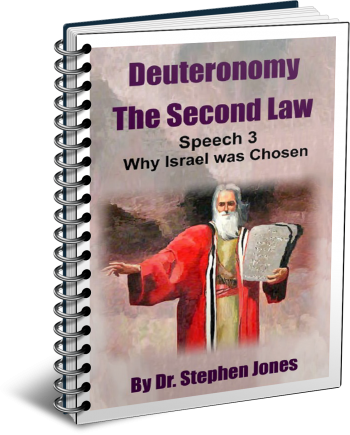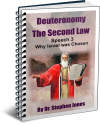Latest Posts
View the latest posts in an easy-to-read list format, with filtering options.

A commentary on the third speech of Moses in Deuteronomy 9-13. The book of Deuteronomy is a series of 12 speeches that Moses gave just before his death at the end of Israel's wilderness journey.
Category - Bible Commentaries

In Deuteronomy 11:26-28, Moses says,
26 See, I am setting before you today a blessing and a curse: 27 the blessing, if you listen to [shema] the commandments of the Lord your God, which I am commanding you today; 28 and the curse, if you do not listen [shema] to the commandments of the Lord your God, but turn aside from the way which I am commanding you today, by following other gods which you have not known.
The list of blessings for obedience is found in Deut. 28:2-14. The curses for disobedience are found in Deut. 28:15-68. We will look more closely at them when we study Moses’ tenth speech.
Moses equates listening (or hearing) with obedience, because the Hebrew word shema can be translated either to hear or to obey. So the King James Version translates it “obey,” while the NASB translates it “listen.” Both are correct.
Moses also tells us that to disobey the commandments is to follow other gods, thus violating the First Commandment. In the New Testament, Paul tells us that the old man of flesh obeys “the law of sin,” while the New Creation Man obeys the law of God (Romans 7:25). Sin is thus personified as another god who commands our flesh to disobey or contradict the law of God.
Paul also speaks of the curse of the law in Gal. 3:10 and 11,
10 For as many as are of the works of the Law are under a curse; for it is written, “Cursed is everyone who does not abide by all things written in the book of the law, to perform them. 11 Now that no one is justified by the law before God is evident, for “The righteous man shall live by faith.”
In other words, those who believe that they can find justification before the law by virtue of their good deeds and their desire to be obedient will always find themselves cursed by the law for disobedience. Why? Because the law will always find fault with mortal men, for “all have sinned” (Romans 3:23).
Paul was not advocating disobedience to the law, but was showing that the law cannot justify sinners, for it cannot condone sin in any form. Some have taken Paul’s statements to mean that one must avoid following the laws of God. Such people advocate sin as a means of attaining righteousness. Some over the years have been proud of their sin, for they use it to demonstrate their immunity to the law’s prosecution. They believe that faith gives them immunity from the disciplines of God.
Such people do not understand either Moses, Paul, or James. Jesus did not die on the cross so that we may continue in sin with immunity. Neither does the Holy Spirit indwell us in order to lead us into sin, but rather into conformity to the mind and character of Christ.
Some have taught that to make any attempt to be obedient to the law is to invite the curse of God. Moses, under inspiration of the Holy Spirit, says precisely the opposite. The curse of the law comes upon the disobedient—not upon the obedient. God never judges us for our obedience, but for our disobedience.
The curse of the law is upon those sinners who come before the law with their portfolio of righteous deeds, not knowing that these cannot negate their sins or prevent the law from judging them as sinners. It requires faith in the work of Jesus Christ on the cross to be justified. Only then is the law satisfied, for the sinner can claim that the full penalty for his sin has already been paid at the cross. The law is just and will not exact a second penalty from the believer, as if to say that Christ’s payment was insufficient to cover the legal requirement.
Moses set before Israel the choice of a blessing for obedience, or a curse for disobedience. This was set forth clearly to the Israelites, so that they would understand the nature of their covenant. Blessing comes by obedience, that is, conformity to the nature of God Himself. The curse of the law is the divine judgment incurred for sin.
Moses says,
29 And it shall come about, when the Lord your God brings you into the land where you are entering to possess it, that you shall place the blessing on Mount Gerizim and the curse on Mount Ebal. 30 Are they not across the Jordan, west of the way toward the sunset, in the land of the Canaanites who live in the Arabah, opposite Gilgal, beside the oaks of Moreh?
Moses later gave more specific instructions in Deut. 27:12, 13, which we will study in greater detail when we discuss Moses’ tenth speech. Six tribes were called to bear witness to the blessings of God while standing on Mount Gerizim, while the other six tribes were called to stand on Mount Ebal and bear witness of the curses for disobedience. This was finally done after Jericho and Ai had been conquered (Joshua 8:30-35).
Moses concludes by saying in Deut. 11:31 and 32,
31 For you are about to cross the Jordan to go in to possess the land which the Lord your God is giving you, and you shall possess it and live in it, 32 and you shall be careful to do all the statutes and the judgments which I am setting before you today.